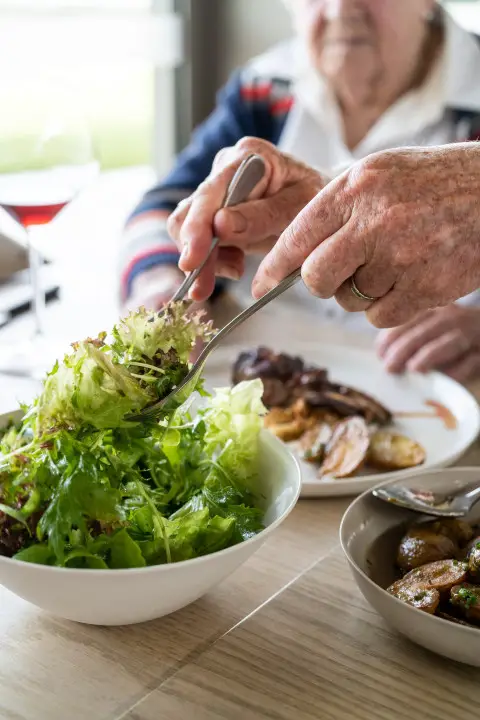
Introduction to Elderly Appetite Loss
Aging is a natural process that brings about numerous changes in the human body. One of the most concerning changes for caregivers and family members is the loss of appetite in the elderly. This isn’t a mere whim or a temporary phase; it’s a significant shift that can have profound implications for an individual’s health and well-being. As people age, their metabolic rate slows down, and their energy requirements decrease. However, the need for essential nutrients remains unchanged. When seniors don’t eat enough, they deprive their bodies of the vital nutrients required for optimal function. This can lead to a weakened immune system, muscle wasting, and cognitive decline. Understanding the root causes of this appetite loss is the first step in addressing the issue and ensuring that our elderly loved ones continue to lead healthy and fulfilling lives.
Recognizing the Importance of Addressing Appetite Loss In Seniors
The importance of nutrition in maintaining health and vitality cannot be overstated. For the elderly, who are often battling multiple health issues, proper nutrition becomes even more critical. It’s not just about the quantity of food but also its quality. Seniors need a balanced diet rich in vitamins, minerals, and other essential nutrients to support their aging bodies. When they don’t eat enough, or when they opt for foods that lack nutritional value, their health can deteriorate rapidly. Weight loss, frailty, increased susceptibility to infections, and a decline in cognitive function are just some of the potential consequences. Addressing appetite loss is not merely about ensuring that the elderly eat their meals; it’s about ensuring that they have the best possible quality of life in their golden years.
Potential Health Conditions and Medication Side Effects
The human body is a complex system, and many factors can influence appetite. In the elderly, several health conditions can lead to a decreased desire to eat. Alzheimer’s and Parkinson’s disease, for instance, can affect the brain regions responsible for hunger and satiety. Thyroid disorders can disrupt metabolism, leading to changes in appetite and weight. Oral health issues, such as gum disease, mouth infections, or poorly fitting dentures, can make eating painful or uncomfortable. Furthermore, many medications that seniors commonly take can have side effects that impact appetite. These can range from causing a dry mouth, altering the sense of taste, or even leading to nausea and digestive issues. It’s essential to have regular medical check-ups and discuss any changes in appetite with healthcare providers to rule out these potential causes.
Common Reasons for Appetite Loss in Seniors
Beyond medical conditions and medications, several other factors can influence appetite in the elderly:
- Lack of Exercise: Physical activity stimulates appetite by increasing metabolism and muscle mass. A sedentary lifestyle can lead to decreased hunger.
- Dehydration: Adequate hydration is crucial for various bodily functions, including digestion. When seniors don’t drink enough, they might not feel like eating.
- Routine Disruption: Our bodies thrive on routine. Eating at irregular times can disrupt the body’s hunger cues.
- Meal Preparation Difficulties: For seniors living alone, the effort required to shop for groceries and prepare meals can be daunting, leading to skipped meals or reliance on unhealthy convenience foods.
- Loss of Taste: Age-related changes can dull the taste buds, making foods taste bland or different than remembered.
- Chewing or Swallowing Difficulties: Dental issues, or conditions like Parkinson’s, can make the act of eating challenging or even painful.
- Emotional Factors: Feelings of loneliness, depression, or grief can significantly impact the desire to eat. For many, food is closely tied to emotions, and emotional distress can lead to appetite loss.
The Psychological Aspect: Depression and Loneliness
Mental and emotional well-being is closely tied to physical health. For many seniors, feelings of loneliness, isolation, or depression can overshadow their lives. These feelings can be exacerbated during mealtimes, especially if they’re used to sharing meals with a partner or family. The act of eating alone can be a stark reminder of their solitude, leading to skipped meals. Furthermore, depression can have physical symptoms, including a loss of appetite. It’s essential to address these psychological aspects, either through therapy, social activities, or simply ensuring that seniors have company during meals.
The Importance of Control and Mealtime Environment
For many seniors, especially those in assisted living or nursing homes, there’s a feeling of loss of control over their lives. This can extend to mealtimes. If they’re served meals they didn’t choose or don’t like, they might resist eating. The environment in which meals are served also plays a role. A pleasant, calm, and social environment can enhance appetite, while a noisy, chaotic, or stressful setting can deter eating. Ensuring that seniors have a say in their meals and providing a pleasant mealtime environment can go a long way in addressing appetite issues.

Conclusion and Recommendations
Loss of appetite in the elderly is a multifaceted issue that requires a comprehensive approach. By understanding the underlying causes and addressing them proactively, we can ensure that our elderly loved ones receive the nutrition they need. Regular medical check-ups, a supportive and understanding approach, and individualized care are crucial. With the right interventions, seniors can enjoy their meals and get the nourishment they need to lead healthy, fulfilling lives.
Sources:
- Mayo Clinic Q and A: Weight loss in older adults can signal underlying health issue
- 10 Reasons Why Seniors Lose Their Appetite – DailyCaring

